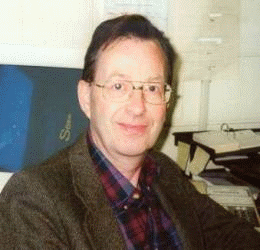 G. Leibbrandt
G. Leibbrandt
Room: MACN 518 EXT: 3291
E-MAIL gleibbra@msnet.mathstat.uoguelph.ca
Professor
B.Sc. McMaster, Ph.D. McGill
 G. Leibbrandt
G. Leibbrandt
Room: MACN 518 EXT: 3291
E-MAIL gleibbra@msnet.mathstat.uoguelph.ca
Professor
B.Sc. McMaster, Ph.D. McGill
The main research activities are in quantum field theory, specifically in the unification and mathematical treatment of gauge theories. It seems that all viable field theories are gauge theories. For instance, the theory of gravity is a gauge theory and so is the theory describing the strong interactions. The theory of superstrings which endeavours to combine Einstein's general relativity with quantum mechanics, is the most radical gauge theory.
Some of the most recent gauge theories are not only mathematically complicated but also conceptually difficult to follow. In order to extract useful information from these theories, researchers need to use clever techniques which reduce the horrendous algebra and thus make the inherent properties transparent. One such approach is to replace covariant gauges like the Feynman gauge by physical (or noncovariant) gauges such as the light-cone gauge, or the Coulomb gauge. Since 1983 physical gauges have become increasingly popular, especially in such sophisticated theories as quantum chromodynamics and superstrings.
Current research aims at developing mathematically rigorous procedures for physical gauges. The latter are used to calculate basic quantities like self-energies of elementary particles, and to derive nonlocal counterterms in Yang-Mills and Chern-Simons theory at the two-loop level.
During the past two years, emphasis has been on the quantization of non-Abelian gauge theories in the noncovariant Coulomb gauge, which has perplexed theorists for 30 odd years. To solve the problem, a new gauge invariant technique, called split dimensional regularization, was developed, which leads to consistent, ambiguity-free Coulomb-gauge Feynman integrals.
BOOK: